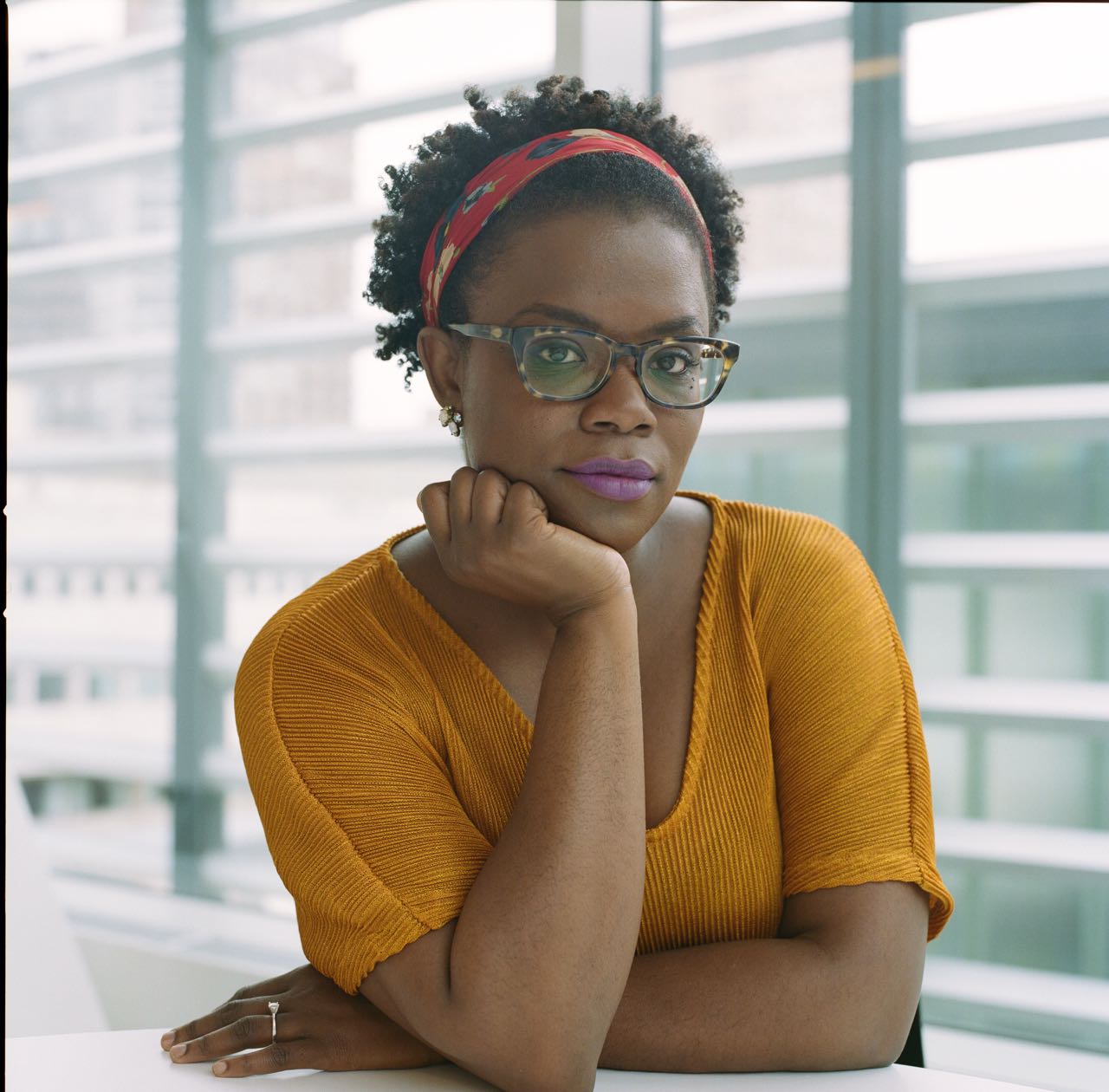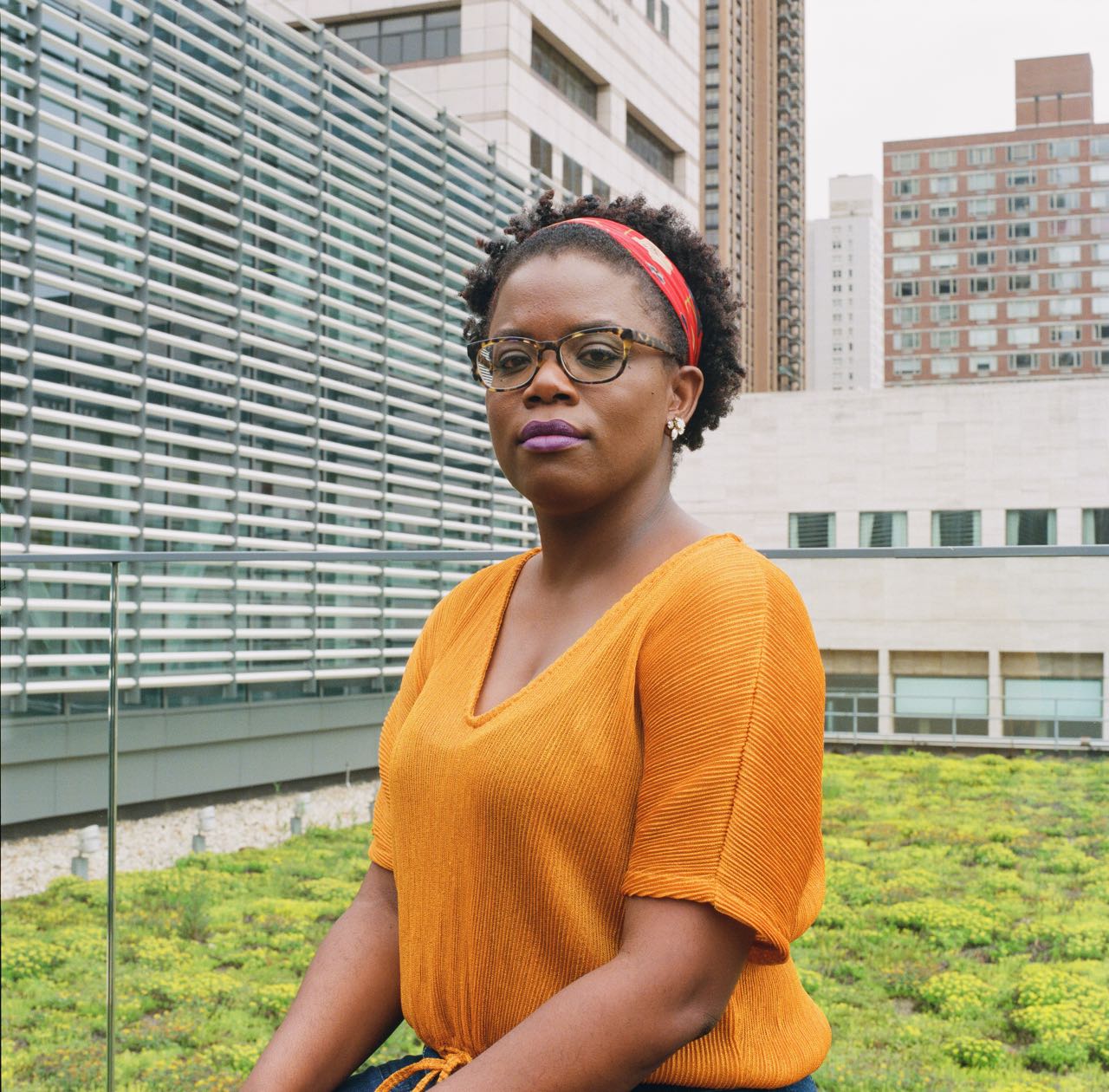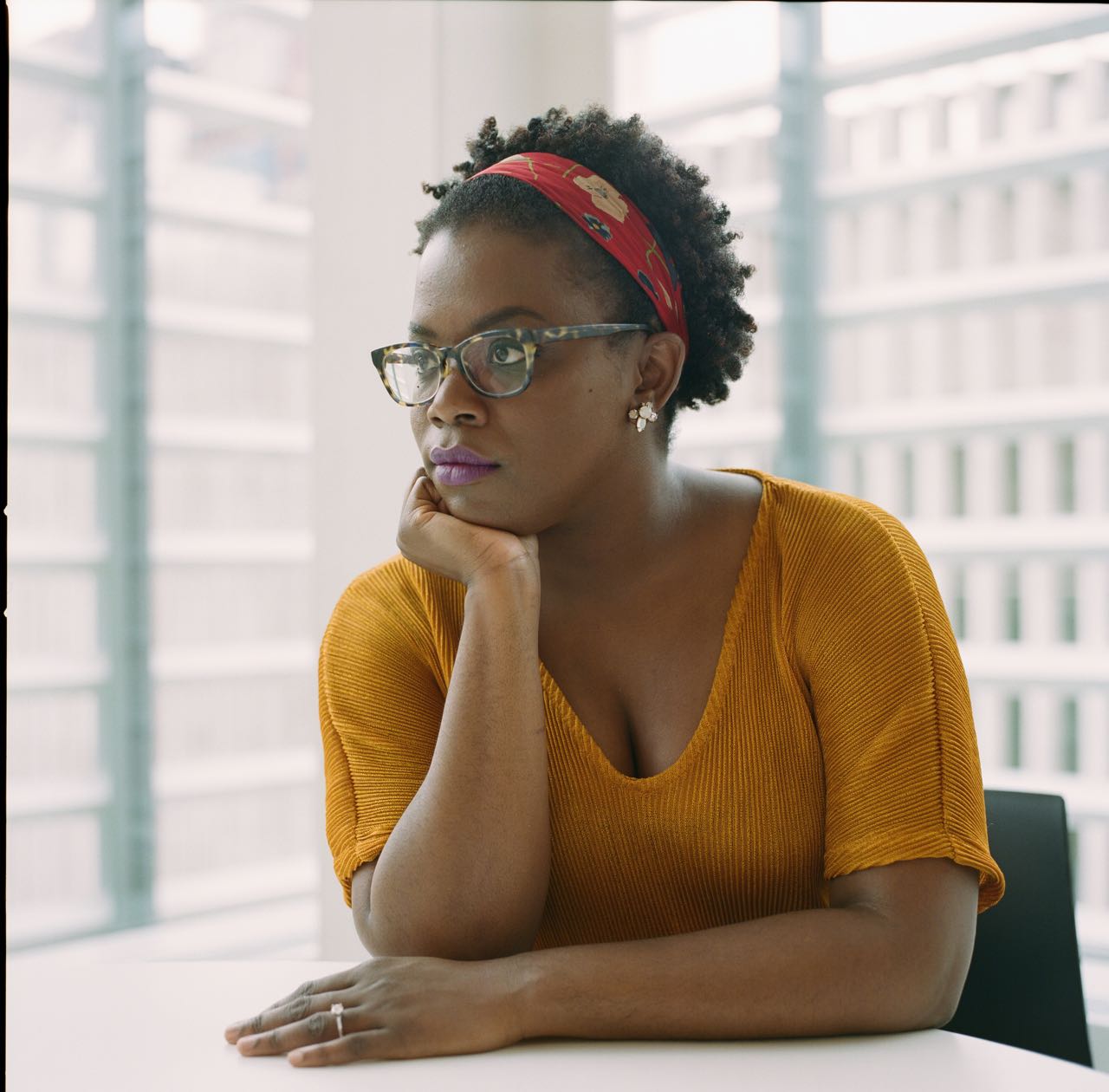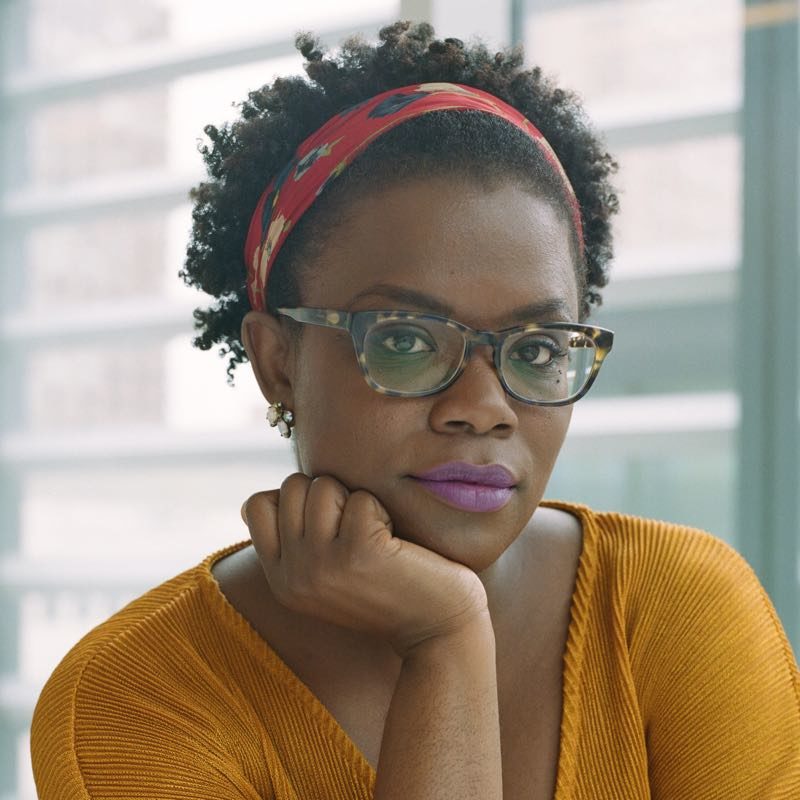Antoinette Nwandu on Pass Over

Written by Victoria Myers
Photography by Miranda Barnes
June 14th, 2018
In Pass Over, a new play by Antoinette Nwandu now playing at LCT3 at Lincoln Center, two black men stand on a corner waiting to get out and move on. Inspired by Waiting for Godot and Exodus, through its use of language and metaphor, it’s a play of epic proportions. It also marks Antoinette’s Off-Broadway debut. Pass Over previously ran at Steppenwolf in Chicago, where racist reviews and a controversy over how to handle them threatened to overshadow the play, it won the Whiting Award, and was filmed by Spike Lee for Amazon Prime. Antoinette’s other works include Breach and writing for the Netflix series She’s Gotta Have It. I recently spoke with Antoinette about her process for writing Pass Over, how spirituality affects her work and life as a writer, how her career has changed, and more.
What was your inspiration for Pass Over?
A lot of it came from the students I was teaching when I was an adjunct, and also teaching full time at Borough of Manhattan Community College. I came in contact with a lot of young, black and brown men from East New York and the Bronx and Brooklyn, who would commute in to Tribeca for college. They were students in my class, and this was at the time of the early part of what is still a wave of violence against young black men. And so it was seeing that in the news, starting nationally with Trayvon Martin’s passing and the court case surrounding that, and the way that turned out, which became a pattern for the way justice has not been granted for these young men who have been murdered. Then, going to work every day and having to see young men who fit that demographic I think was a huge cauldron for the kinds of feelings that I was having, and then just wanting to express all of that and put that into a story that was both theatrical and dramatic.
Was there a moment when you knew you were ready to sit down and write? When it actually felt like, “I know what this play is”?
I started writing this play around the very end of 2013, beginning of 2014. And I was still teaching at that time, so the process was very slow, but I knew then that I was angry enough and I had enough material that I wanted to start getting things down on paper. And usually with plays, I go through a lot of drafts and a lot of iterations, and a lot of versions. My writing process is a lot like I would imagine what an actor does when they do various takes of something; when I start writing I will just have take after take after take. And then I put it away for a little while, and then I go back and see what is still landing, or what is still making sense.
I had a lot of takes with Pass Over at the beginning, and then I finally sort of hit on the combination of talking about these themes in three layers. We talked a lot in the rehearsal room about the three layers in the play: the biblical layer, which is set in Egypt, of Moses; the slavery layer, which is set on a plantation—and you can just think of these two young men a hundred and fifty years ago as slaves wanting to escape; and then the modern layer. When I hit on that, it was like okay, now I at least know what I’m dealing with.
When you’re writing, are you visual?
Not at the beginning. I think I’m a lot more sensitive to sound. Especially with this play, because the language is so syncopated and it is so rhythmic. The dialogue is sort of musical for me, and my dialogue is usually pretty musical. I would say when I start writing, I start with the characters. I definitely hear the characters’ voices, and I hear the emotion in their voices a lot more than seeing what they’re doing with their bodies. That usually fills in later for me.
Do you see your plays as plays when you’re writing them?
I definitely think of them as plays. I definitely think of them as stories that have to live in a theatrical space. Once I start to see things happening, it’s definitely on the space of the stage, and I’m aware of entrances and exits and things like that.
You mentioned being driven by language and its musicality. Do you also use the rhythm of the language as a structural thing?
Definitely, especially with this play. There are moments when the sentence structure or dialogue is affected by sound and by rhythm as much as by meaning. And there are times when I hit on some really beautiful sentence structures or really beautiful ways of saying things because of a specific metric necessity.
I didn’t create any specific rules for myself, but the play is written in broken lines with very little punctuation, so it does look kind of like poetry on the page. Once I knew I was going to do that, then it sort of created constrictions. I need to have very strong boundaries and constrictions when I write. So focusing on the sound and on the structure in that way was really helpful.
I looked at the excerpt that was in The Paris Review of how it actually looked on the page. When you were writing and then going into the rehearsal process, how did you figure out how to get that to play on stage? Because reading something on the page is a very different experience than hearing somebody say it.
That really falls to Danya Taymor, who directed it, and also to the actors themselves and their ability to respond to the lack of punctuation, for instance, as a freeing thing. I do think that this play kind of weeds out actors and kind of chooses actors who are up to the challenge of being playful in that way, and to coming to the text on the page with a certain amount of creative license within themselves to try the same sentence as a question, as a statement, as a joke, try it this way, that way. The context gives a lot of clues for how things should be said, but I’m allowing certain spaces for a jazz-like improvisation, which is what I wanted from the actors, because they’re two guys standing around, so I wanted there to be the ability to riff on meaning or on tone. I think it was just a credit to the actors and to Danya for making that translation happen.
You mentioned earlier about the three different contexts or layers of the play, and I read that Waiting for Godot was also an influence. How did you build in those influences and are there any others that you see?
It’s definitely its own story, but it’s my meditation on some of the themes in Waiting for Godot. And then also some of the themes in the biblical Exodus story of Moses, and how those two texts are kind of completely at odds thematically. In the Exodus story, the children of Israel do get to the promised land, and knowing how important that story structure and that language has been in the African American community, especially, like with all the negro spirituals that are biblical in nature, and the references to crossing the river of Jordan, and to getting to the promised land—from the Antebellum south all the way through the Civil Rights Movement. When you look at like the writings and the speeches of Dr. Martin Luther King Jr., for instance, there’s always biblical imagery as a reference point. So it was important for me when thinking about this play and thinking about these two young men to meditate on the kinds of stories they had been told and the kinds of images they might have access to, to sort of describe their situation. But then also that sort of Brechtian existential dread and questioning—is this story ever actually going to come true? So those were the foundational texts that I think this play helps me to meditate on.
Was there a particular moment that was the most challenging to write?
Not really. The play came in two big sections. When I did the workshop production at Cherry Lane, back in April of 2016, the play ended very differently. I don’t want to give away the ending, but it was different. And there were some elements in it that were very different. One character didn’t exist. The basic structure of Moses and Kitch standing around was definitely there, but then it went through a pretty big transformation during the Steppenwolf rehearsal process.
But I don’t think that part was hard. It was challenging because I was doing major rewrites during rehearsal, so that’s always physically taxing, but because I had the Cherry Lane workshop, I knew exactly what was working and what wasn’t. So I came into Steppenwolf with a plan. Similarly, for Lincoln Center, it’s now been a year since Steppenwolf, so I came in with a plan. I feel like when you have a plan and a team, then changes that do feel daunting get a lot easier.

You mentioned the play having a Biblical and epic quality to it. Was there ever any negotiation in your mind between wanting to do that and knowing that most emerging playwrights don’t get huge cast sizes or other things that might help in making something epic?
I’m actually not a subscriber to the idea that cast size needs to be restricted. I think that’s something that theatres tell people when they don’t know how to tell them no. I think that in the exact same way, like dating, if I like somebody but dating that person is really hard, I will go the lengths to make it work if I want to make it work. I think large cast size plays get developed if the theatre thinks it’s worth investing in.
So I never approach my work based on, “What do I have to do to get this produced.” I approach my work based on, “What do I have to do to make this good?” And I think the blessing and the curse for me is that I am my own hardest critic. I knew that I wanted it to be a small cast size. I knew that it could only be Moses and Kitch—as opposed to like five guys standing around—because I also wanted it to feel like maybe these are the last two black men. I am hugely influenced by Suzan-Lori [Parks], and she has that play, Death of the Last Black Man in the Whole Entire World, and this play is not similar to that one—in fact with this play, sometimes people talk about it a little bit like Topdog/Underdog, which if anybody ever says that, that is a huge compliment.
But the cast size was determined by what I wanted the play to feel like. And I think that the epic comes in from the dovetail with the biblical story. If you put a man on stage and his name is Moses, he instantly has a backstory and he instantly has pressure. It’s not an easy name to have. And then also from the language. And the set was also super stark and great. So I felt like that’s how we were going to do it.
In a more general sense, what other areas of culture do you feel like influence your work?
Definitely current events, definitely art. I feel like being a writer and existing in the world is kind of like being a giant whale with the baleen that just like hangs down from their mouth. And it’s just like that netting where they open their mouths and all the seawater comes in, and then anything that they need to eat gets caught in the baleen, and then they’re just like constantly eating. I feel like that’s exactly what being a writer is like. That just anything, whether it’s a random conversation, or I’m always saving news clippings and stories, or just an interaction with a person, or a song that you hear, a poem that you read—that all just kind of gets mashed together in the brain.
I was reading another interview that you had done where you said that television was a big influence.
I watched a lot of television as a kid. I actually did not really go to the theatre as a kid. I didn’t start going to the theatre regularly until I worked as a critic. After grad school, after my first master’s degree, I worked as a critic because I could get free tickets to see theatre, which was a new thing that I was interested in. But as a kid I watched a lot of TV, so TV has a huge influence on my storytelling and on the way that I understand performance. I think TV and church are the two places that I really understood performance the most.
Do you have a spiritual life?
I was raised in church. I went to church pretty religiously, no pun intended, until I got to college, and then I took about seven years off where I was not really concerned with that, and then I went back to church pretty hardcore. For the last two and a half years, I’ve stepped away from that practice in New York. But I do still—and I think even more so when you strip away the external routine of it—I am still deeply concerned with and connected to a spiritual practice that includes prayer and meditation, and also thinking about life from a Christian worldview, and what that means on a really basic level for how I treat people. I think that’s where it manifests itself in the most practical way.
Do you feel like it affects your writing?
Absolutely. I mean I do come to writing with a fairly clear knowledge of biblical text, and I do think that has an effect on my tendency towards epic, or towards something that’s sort of grand or broad in scope. I think it also sometimes affects the tone of my stories—they can be a little severe at times, which I sort of credit to my biblical upbringing. Severe meaning sharp twist and turns, and jagged things happening to people. Exciting, but sometimes sad things happening to people.
Does it also affect your views on writing in the grander scheme of things, like why you’re doing it?
I write to heal. I think to heal myself and to heal any audience member who’s willing to be healed. I think that writing and storytelling and the stories that we believe and the stories that we expose ourselves to do affect us and affect how we make sense of the world. And then, once we make sense of it, how we go out and act in it. I think on a certain level, the fact that I think that people can be healed, and the fact that I think that transformation is possible no matter what stage of life you’re in, is something that I credit to a Christian worldview. If a person comes to the theatre and comes to a place where they want to think about civic themes or national themes or race or gender or class, then there’s some chance that that person can still change the way they live if they want to.
When Pass Over was at Steppenwolf, there was a controversy that erupted over critics’ responses to the play. What was that like for you on a personal level?
Ultimately, it was affirming, because I knew that my play was affecting people and that it was making people talk and that it was making people feel things. I think so often in the theatre, unfortunately, I’ve had the experience of seeing a play on Tuesday and forgetting exactly what I saw by Wednesday. And I knew that regardless of anything else, that was not the case with my play.
Is there anything you wish had been part of that conversation that wasn’t?
No. I was really grateful to American Theatre Magazine for giving me a space to speak my mind. I think I was able to say everything I needed to say.

Going forward with this production, what do you hope audiences take away from it? Or do you not think about it like that?
I don’t think about it like that. I hope audiences do take something away. I think that’s sort of up to each individual audience member. We all come to the theatre with our baggage, and hopefully we leave with our baggage a little bit shifted. I hope that audience members open up in themselves a space where they can value black life. I think that’s a very, very, very basic, but also very necessary message in this country.
At this point in your career, what do you see as your biggest hurdle? And do you feel like that’s changed in the last few years?
It has changed. My life is very different than it was about 25 or 26 months ago, when I was still teaching full time while trying to juggle writing, and so the pace of my writing was a lot slower. Now, I’m in the middle of my New York Off-Broadway debut, and I just wrapped in a writer’s room [for She’s Gotta Have It], and I’ve got several really exciting projects on my plate right now.
So my hurdle now is responsible time management. Whereas I would say, even 3 years ago, my biggest hurdle was staying motivated even though it felt like nobody else cared about what I was writing—and now that is no longer the case. Now there are a lot of people who care, and a lot of people who are imposing deadlines on me. I’m super excited to be in the mix with a lot of different people in theatre and TV and film. Conversations are happening about everything, so that’s great.
Is that weird psychologically to go from one extreme to the other?
It totally is. I think it was about 4 months ago, I started really paying attention to the fact that like there was a part of my brain that was waiting for things to slow down again so that I could process everything. And then I was like, “I think you need to find ways to process in tiny chunks as you go. Because if things go well, they’re not going to slow down again for a little while.” So to process it as it’s happening, and make sure that you keep perspective and keep people around you that keep you grounded and that are not swayed by the business and the craziness.
Over the next few years what are your professional dreams?
For the next three years, I think those dreams are manifesting. I’ve got four commissions, which are in various states of finished and not quite finished, and then one of them I haven’t even started. So that’s exciting. Those plays are getting done and coming out of me, and then my hope is that I’ll get hired to do a few feature film projects and then get back into a writer’s room at some point in the not too distant future.

